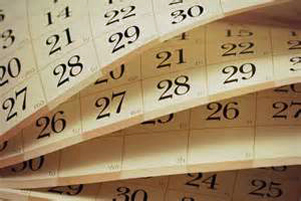Paper Calendars Endure Despite Digital Age
 The following item is excerpted from an article that appeared in the New York Times by Christopher Mele, Dec. 30, 2016
The following item is excerpted from an article that appeared in the New York Times by Christopher Mele, Dec. 30, 2016
With the year’s end comes the ritual of many households and offices: getting new appointment books, planners, or calendars to hang on walls or put on desks.
In an age of smartphones and the internet, you might think the days of paper calendars are numbered, but data suggest otherwise. Not only have they survived the digital revolution, but sales of some kinds of print calendars have increased.
The sales of appointment books and planners grew 10% from 2014-15 to 2015-16 to $342.7 million, and decorative and other calendars increased by 8% to $65 million in that time, according to figures from the
NPD Group, a consumer research firm.
Personalization has helped make planners and appointment books popular, Leen Nsouli, an analyst of the office supplies industry at NPD, said in an email. "The consumer can customize a planner to fit his or her style with accessories, colors, and even color code events and activities," she wrote. "That’s not something you can do on the standard phone calendar."
Jerome Hoxton, president of Tru Art Advertising Calendars in Iowa City, Iowa, said traditional calendars remain popular because they combine aesthetics with utility. Paper and digital calendars can readily coexist. "What we found is it’s a question of and," he said. "It’s not a question of or."
Bertel King Jr., in a blog post last year for
Make Use Of, a technology and productivity site, made the case for paper calendars, noting that he was "inundated with notifications, beeps, alerts and messages."
King wrote that "having to open another tab, fire up another piece of software, or launch another app to access my calendar amounts to one more onscreen thing vying for my attention," King wrote, adding that "suddenly a paper planner starts to make sense."
It may seem counter-intuitive that a print product can thrive in the digital age. But the continued success of some paper calendars mirrors that of printed books, an industry that several years ago was confronting what seemed like the very real possibility that e-books would outsell the printed variety. Instead, a
Pew survey this fall found that most readers still preferred their reading material printed on paper.
Still, the popularity of some calendars—desk pads and the ones that hang on your wall — has waned. The average number of printed calendars in households was 3.12 in 2011 compared with 3.98 in 1981, according to the most recent study sponsored by the Promotional Products Association International and the Calendar Advertising Council. The kitchen remained the prime display location, with 75% of respondents saying they had a calendar there. The average number of printed calendars per business was 2.10, down from 2.56 in 1981, according to
the study.
A 2008 paper from Virginia Tech, titled "An Exploratory Study of Personal Calendar Use," predicted the march of electronic calendars would be swift and inevitable. "With the increased use of mobile devices, more and more calendaring tasks are performed off the desktop computer," it said.
A bright spot in the industry remains promotional calendars, like those distributed by real estate agents, medical professionals, car repair shops, and other businesses. As a percentage of sales of promotional products, those calendars have held steady or increased slightly from 2012 to 2015, according to industry figures.
Melissa Ralston, marketing director for BIC Graphic, said in an email that companies have found paper calendars to be an effective advertising vehicle with a mass market appeal. She said studies have found that 82% of recipients enjoy getting a calendar as a complimentary gift and 70% plan to do business with the company that provided the calendar.
As for Ms. Ralston, she practices what she preaches. She said she has three calendars: a planner, a wall calendar, and one on her refrigerator.
TAPPI
http://www.tappi.org/
 The following item is excerpted from an article that appeared in the New York Times by Christopher Mele, Dec. 30, 2016
The following item is excerpted from an article that appeared in the New York Times by Christopher Mele, Dec. 30, 2016  The following item is excerpted from an article that appeared in the New York Times by Christopher Mele, Dec. 30, 2016
The following item is excerpted from an article that appeared in the New York Times by Christopher Mele, Dec. 30, 2016